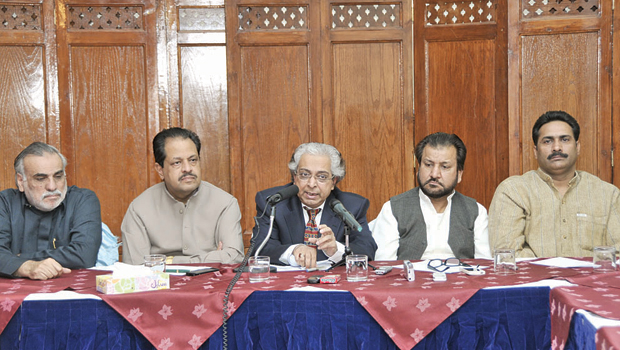Irshad Salim, a consultant, journalist and motivational speaker and an American national living in New York, was delivering an informal talk to Pakistani expatriates in Riyadh during the weekend. He is currently visiting the Kingdom on a professional consultancy assignment.
During the lecture, he mentioned that it was very important for both Saudi Arabia and Pakistan to improve bilateral relations and take them to the heights achieved by the late former Pakistan Prime Minister Zulfiqar Ali Bhutto and the late King Faisal.
He also praised the current leadership of Custodian of the Two Holy Mosques King Abdullah, who he said has played an effective role in interfaith dialogue.
“Pakistan and Saudi Arabia have both suffered at the hands of the terrorists and have worked together with the international community to fight terror,” he said. He added that he still loves Pakistan, calling himself a “stranded Pakistani in America.” The program was hosted and anchored by Faiz Al-Najdi.
The talk was primarily focused on Pakistani affairs and Pak-US relations and the new phenomena and dimensions in domestic politics emanating from the emergence of former cricketer turned politician Imran Khan as a political force.
In his opening remarks, Salim emphasized the need for a better working relationship between Pakistan and the US. He said there was a need to “understand” the US and its policies. He underscored the need and importance of establishing a think-tank in Pakistan that could provide an understanding of the US and its political principles and policies.
He informed delegates that the US had at least 200 such organizations dedicated to studying and conducting research on all aspects of Pakistan, “be it social fabric, politics, military, intelligence-ISI, state of economy, economic outlook, plans and strategies and our strengths and weaknesses.”
He said Pakistan does not have a single institution that can carry out similar studies on the US.
“Even India has dedicated institutions to study Pakistan. Unless we come out of our own shell and open up to the world we have no sustainable chance of improving our community and our mindset.”
He said Pakistan happens to be surrounded by hostile borders on all three sides, including a fourth in the south — the Arabian Sea, which is prone to enemy attack or blockades. “We are in a state of war since our birth,” he added.
He emphasized that the youths of the country have a lot to offer. “They must take part in an analytical assessment of its political system and should be given freedom of expression, political association and freedom of movement,” he added.
“The country is fortunate to have a large youth population and we are in fact blessed to have about 60 percent of our population comprising youths between the ages of 18 to 26 years. We must harness this huge human capital for the benefit of the country.”
Commenting on Pakistan President Asif Ali Zardari and former Prime Minister Nawaz Sharif, he said both came into the Pakistani politics accidentally. According to him Zardari became a politician by virtue of his marriage to Benazir Bhutto.
“Nawaz Sharif did not want to enter into politics but his father Mian Sharif (aka: Abba Jee) persuaded him to jump into the bandwagon.”
According to Salim, both parties (PPP and PML-N) were following the politics of “inheritance” and according to him, this would continue for another 10 to 15 years before a change occurs.










